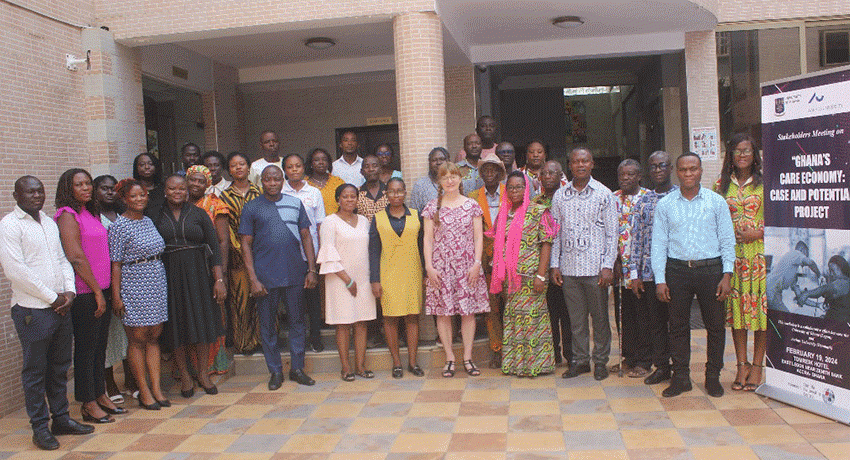Participants from diverse sectors gather to discuss Ghana's care economy, representing various stakeholder groups from across the nation.
At a workshop organized to share the preliminary findings of the project "Developing Ghana’s Care Economy: Case and Potential," researchers shared troubling observations on the realities faced by care receivers in Ghana. From caregivers' absence to care receivers being left alone without access to food, the observations underscore the urgent need for concerted action to address critical issues within the country's long-term care (LTC) systems.
The project, led by researchers from the University of Ghana and supported by the Danida Fellowship Centre (DFC) through Aarhus University, aims to address these issues within the Ghanaian social and cultural context. Principal Investigator Prof. Charles Ackah emphasized the importance of advancing evidence for policy formulation to effectively navigate the evolving landscape of long-term care.
“This study is a response to the changes taking place in Ghana’s long-term care economy and the concerns and challenges they present,” he stated, highlighting the project’s purpose.
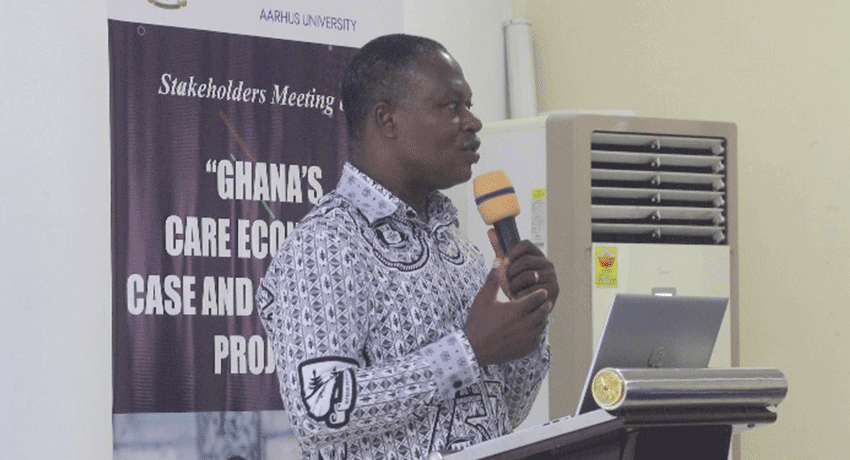
Charles Ackah welcomes attendees and presents the rationale for the project overview, setting the stage for the event.
Co-Principal Investigator, Prof. Ulrika Enemark of Aarhus University, urged the attendants to engage actively in the discussions, emphasizing the importance of stakeholders’ involvement in developing effective solutions and evidence that can be translated for use.
The workshop, organized on 19 February in Accra, not only discussed the findings but also facilitated broader discussions on sustainable and dignified long-term care solutions for Ghana's senior citizens and their caregivers.
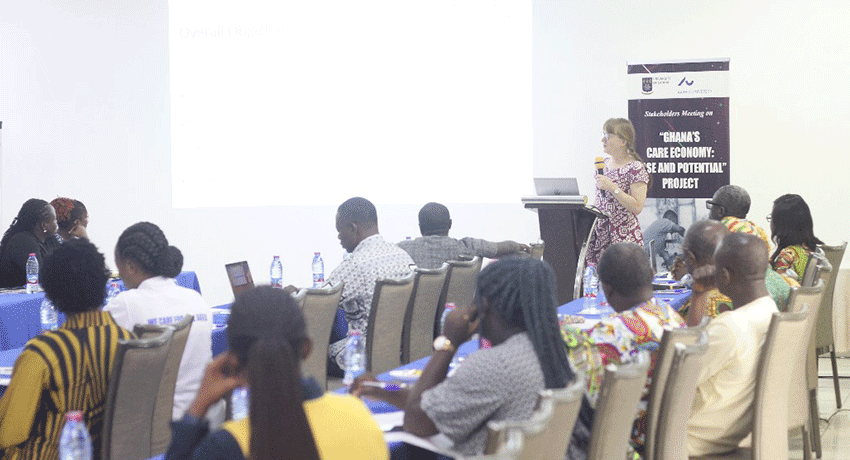
Prof. Ulrika Enemark, traveling from Aarhus University to Accra, welcomes the chance to connect with co-researchers and engage directly with stakeholders, and discuss addressing critical issues within Ghana's care economy.
Highlights of the findings
The study's findings reveal a concerning trend: middle-aged women predominantly shoulder the informal caregiving burden, while men are disproportionately represented as care entrepreneurs. Despite rising interest in residential homes, homecare remains the most common form of eldercare service, with female entrepreneurs leading in the residential home sector.
Moreover, entrepreneurs in the eldercare sector face numerous challenges, including family management issues, limited access to finance and government support, and instances of sexual harassment.
Participants engaged in dialogue on the development of better LTC services, highlighting the need for evidence-backed policies tailored to address the evolving care economy in Ghana and solutions that can address the needs of both care receivers and caregivers. Participants were unanimous in underlining the need for people to start old age financing early in life to help promote sound and sustainable long-term care and well-being.
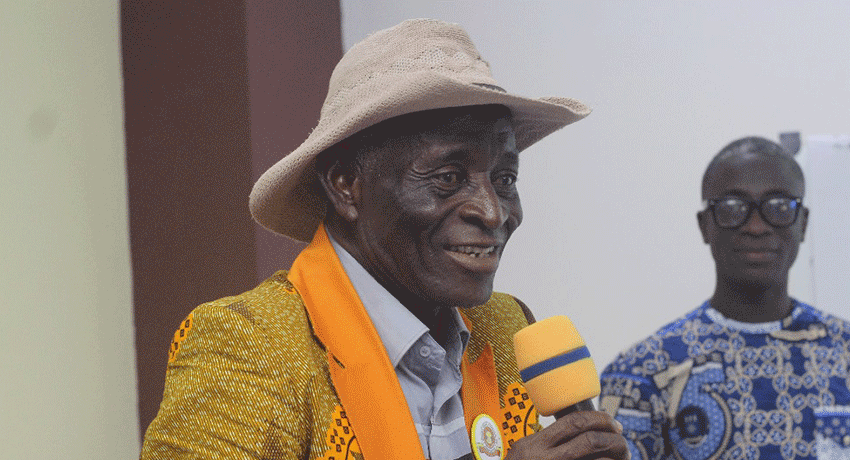
Participants, including senior citizens, were generous in sharing insights and personal stories, adding depth to the discussions.
What next
A better and more professional LTC service provision in Ghana could reduce care burdens, improve care quality, and yield larger employment, education, and business opportunities primarily for women. Collaboration among stakeholders is vital in achieving this goal. As the "Developing Ghana’s Care Economy: Case and Potential” project progresses, enriched by insights from the workshop, continued collaboration and support are crucial for the effective implementation of recommendations and solutions.
“By prioritizing the well-being and dignity of Ghana's senior citizens and their caregivers, we can work towards building a more inclusive and supportive care economy for all,” Prof, Ackah said.
The project team includes Prof. Charles Ackah, ISSER; Prof. Ulrika Enemark, Aarhus University; Prof. Justice Novignon, University of Ghana, and Prof. Isabella Aboderin, University of Bristol (UK). The rest are Prof. Razak Gyasi, Dr. Frank Kyei-Arthur, and Dr. Richmond Owusu. The team also includes PhD candidates namely, Daniel Offei, Golda Anambane, Stephen Tettey Nortey, and Adjeiwaa Affram. For inquiries about the project, please, contact the Principal Investigator, Prof. Charles Ackah at cackah@ug.edu.gh
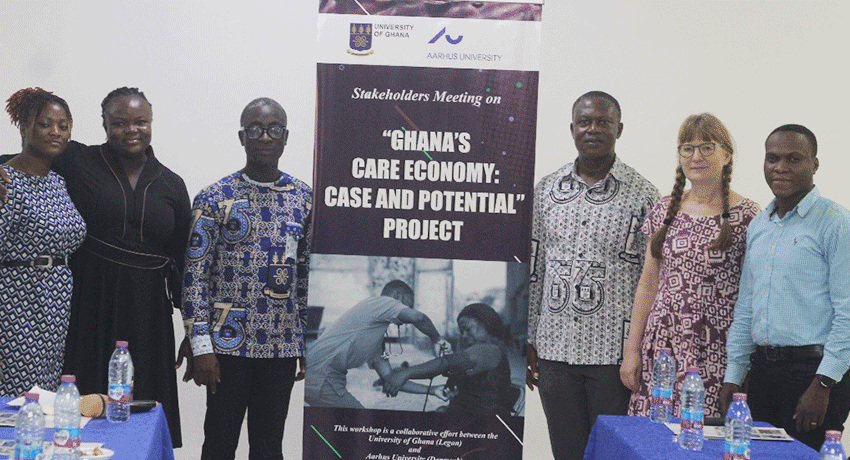
Project team members (left to right): Adjeiwaa Affram, Golda Anambane, Daniel Offei, Prof. Charles Ackah, Prof. Ulrika Enemark, and Stephen Tettey Nortey.
- Log in to post comments

